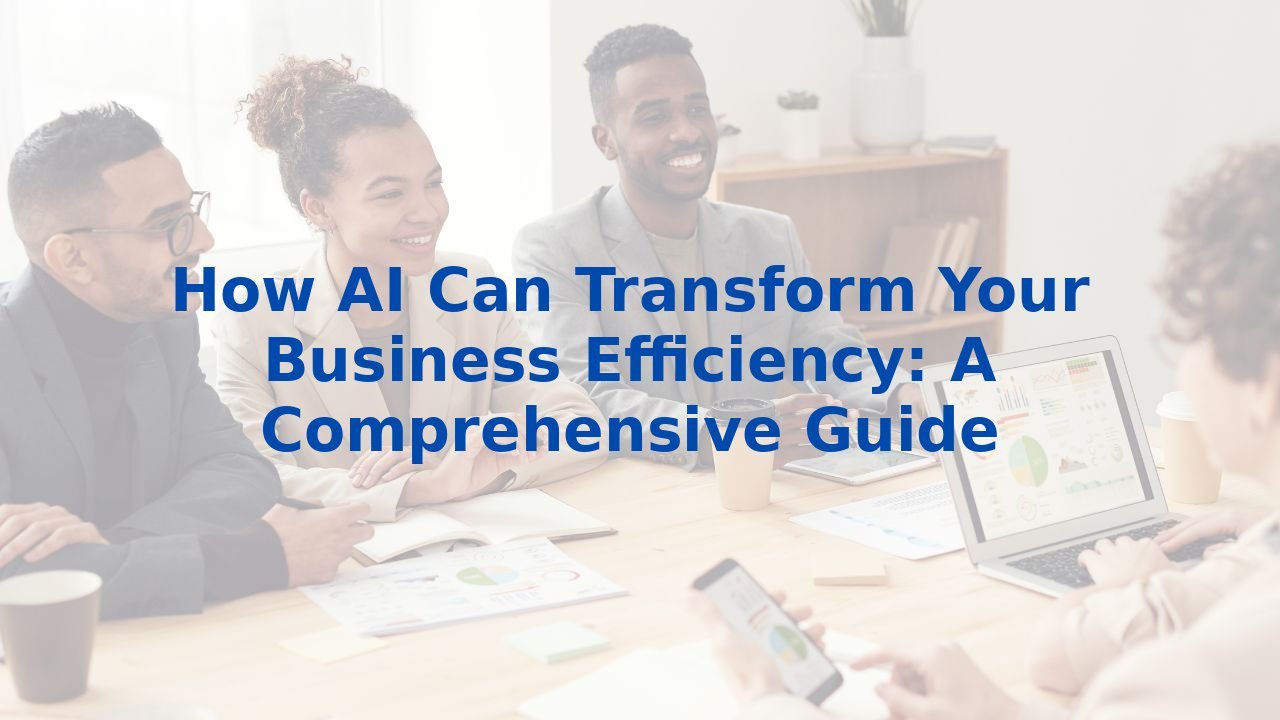How AI Can Transform Your Business Efficiency: A Comprehensive Guide
Enhancing Business Efficiency with AI: A Comprehensive Guide
Introduction
In today's fast-paced business environment, efficiency and productivity are more than mere buzzwords; they are the lifeblood of competitive advantage. Artificial intelligence (AI) has surfaced as an extraordinary tool to optimize business processes, driving operational efficiency and precision. In this guide, we will explore how AI can enhance various business operations, spotlighting its multifaceted benefits and the integral role of employee training in harnessing these advancements.
1. Automating Routine Tasks
Imagine a workspace where mundane tasks fade away, leaving room for creativity and strategic thinking. This is one of AI's primary gifts—its ability to automate high-volume, repetitive tasks such as document processing and data entry. Intelligent document processing (IDP) exemplifies this capability by extracting data from documents, thereby minimizing the need for manual input and drastically reducing errors.
2. Improving Decision Making
In the world of business, timely and accurate decision-making can define success or failure. AI elevates this capability by providing predictive insights based on comprehensive data analysis. It can reveal hidden trends, forecast outcomes, and even pinpoint the root causes of issues. For example, business analysts can utilize AI to simulate scenarios, enabling them to make data-driven decisions that can positively impact profitability.
3. Enhancing Customer Service
Customer expectations are on the rise, and AI is stepping up to meet those demands. By integrating chatbots and AI-driven feedback analysis, customer service departments can dramatically improve response times and personalize interactions. Automated systems can handle routine inquiries, allowing human agents to focus on more complex issues, thus enhancing the overall customer experience.
4. Optimizing Supply Chain Management
Supply chain management is a complex puzzle, but AI can help piece it together seamlessly. By examining purchase data in real-time, AI can quickly identify anomalies—like a sudden spike in demand for a specific product—alerting the necessary parties to take action. Further efficiency can be attained through robotic process automation (RPA), which automates ordering processes directly from supplier systems.
5. Improving Product Development
Innovation is essential for growth, and AI is leading the charge in revolutionizing product development. With capabilities such as generative design, AI can assess numerous design possibilities based on specific requirements, accelerating the process and reducing the need for multiple prototypes. Moreover, AI aids in content generation, making it remarkably easier to craft engaging product descriptions and informative articles.
6. Enhancing HR Processes
The realm of Human Resources is not exempt from AI's transformational capabilities. By infusing objectivity into processes like salary negotiations and recruitment, AI enhances the overall employee experience. It can streamline candidate assessments, allowing HR teams to spend less time on repetitive tasks and more time cultivating talent and enhancing team dynamics.
Benefits of AI for Business Efficiency
Integrating AI into business practices is not just an innovative approach; it's a strategic necessity. Here are several key benefits:
- Improved Operational Efficiency: AI automates routine tasks, significantly reducing the labor burden and minimizing errors.
- Enhanced Decision Making: AI delivers predictive analysis, empowering businesses to make informed decisions.
- Increased Productivity: With repetitive tasks automated, teams can concentrate on strategic and creative endeavors.
- Better Customer Experience: Quicker response times and personalized interactions lead to heightened customer satisfaction.
The Importance of Employee Training
However, the magic of AI can only be fully realized if the workforce is adequately trained to operate within this new paradigm. AI training empowers employees to leverage technology effectively, ensuring that organizational benefits are maximized. This includes skills in data analysis, process automation, and seamless integration with other technologies, like RPA and process mining. For businesses looking to equip their teams with AI skills, exploring comprehensive training solutions is key.
Conclusion
In conclusion, the infusion of AI into various business processes is nothing short of revolutionary. By automating routine tasks, improving decision-making, enhancing customer service, optimizing supply chains, and refining product development, AI emerges as a pivotal force for operational efficiency. Yet, for organizations to fully capitalize on these advantages, investing in employee training is indispensable. By embracing AI and committing to ongoing employee education, businesses can fortify their stability and adaptability in an ever-evolving marketplace.



